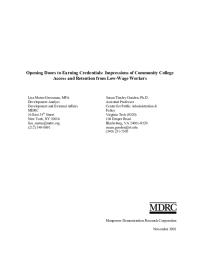Opening Doors to Earning Credentials
Impressions of Community College Access and Retention from Low-Wage Workers
Based on qualitative data from focus groups conducted at six community colleges nationwide, this paper examines educational access and retention issues for low-wage working parents. The paper reports early impressions from three different groups of low-wage working parents: those who are current community college students, those who had dropped out or stopped out of community college programs, and those who had never attended credit-granting community college programs. Some of the factors that have acted as barriers or supports for low-wage working parents include: institutional issues at the colleges themselves (e.g. counseling, financial aid, and special programs), issues with organizations external to the college such as employers and government agencies (e.g. TANF work requirements, employer tuition reimbursement programs, and conflicts between college and work schedules), and personal factors in the lives of the low-wage workers themselves (e.g. access to child care, domestic violence, and personal motivation). These findings provide a compass for suggesting potential program models and ideas for future MDRC research.







